Chooks at the Rooke: Farmer turns egg industry ‘waste’ chicks into gourmet rooster meat
Xavier Prime’s roosters weren’t supposed to see a single day of life. Now they spend 150 days on pasture, and earn income.
XAVIER Prime’s pasture-raised chickens are winning national awards for taste.
They’re also winning customer loyalty from Australia’s top chefs.
So, it’s a surprise that the free-range meat birds were destined to live just one short day, with no chance of scratching, pecking, clucking – nor hitting a plate – until the young farmer from Cororooke stepped in.
“I knew when we started with the eggs, in my eyes the day-old male chicks being culled in the egg industry was a big problem,” said Xavier, who six years ago founded Chooks at the Rooke, in southwest Victoria.
“Our eggs don’t come at the expense of a day-old male chick.
“These roosters, which weren’t supposed to see a single day of life, now see 150 days on pasture.”
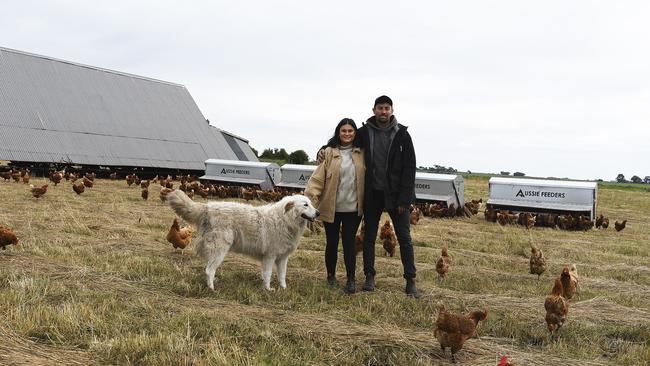
Male cockerels are now an exciting and successful part of the free-range egg and poultry meat business Xavier runs on his 65ha property with his partner, Kimberley Burridge, and their young son, Max.
At any one time, the couple tends about 6000 chickens – 3000 hens and 3000 roosters.
When they made their start, Xavier followed the blueprint of other successful pastured egg producers, such as US celebrity farmer Joel Salatin, with a sharp focus on animal welfare and sustainable farming practices.
He built giant mobile hen houses that shift daily to fresh pasture, providing ample shelter, feed and water while allowing chooks to graze grass and scratch for bugs and grubs.
But, Xavier couldn’t find anyone else rearing young roosters for meat.
So he decided to wing it, and learn using trial and error.
BUILD A FOLLOWING
At first, Xavier and Kimberley had little idea how long it would take to get male birds to processing weight, how they needed to be cooked, how the meat tasted or who was interested in buying them.
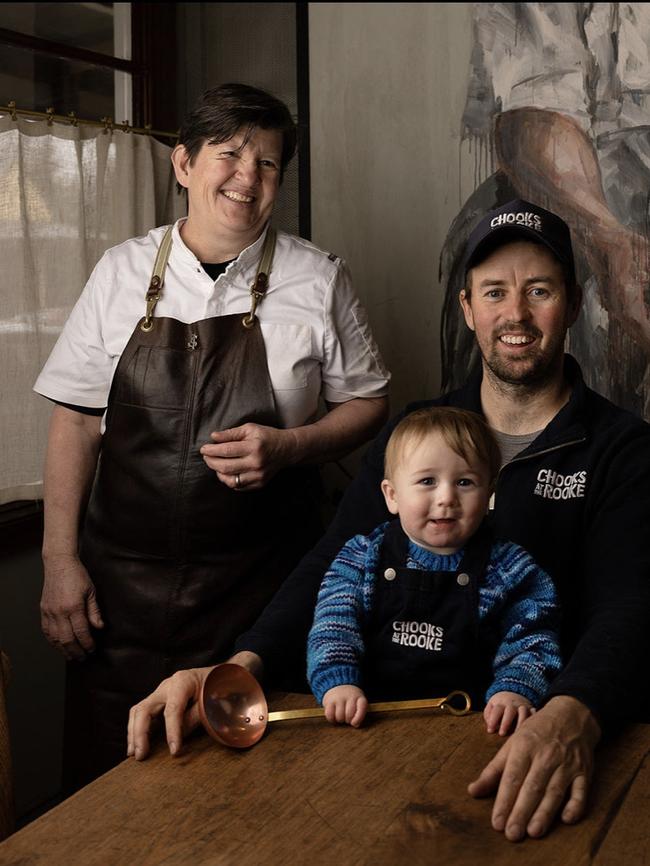
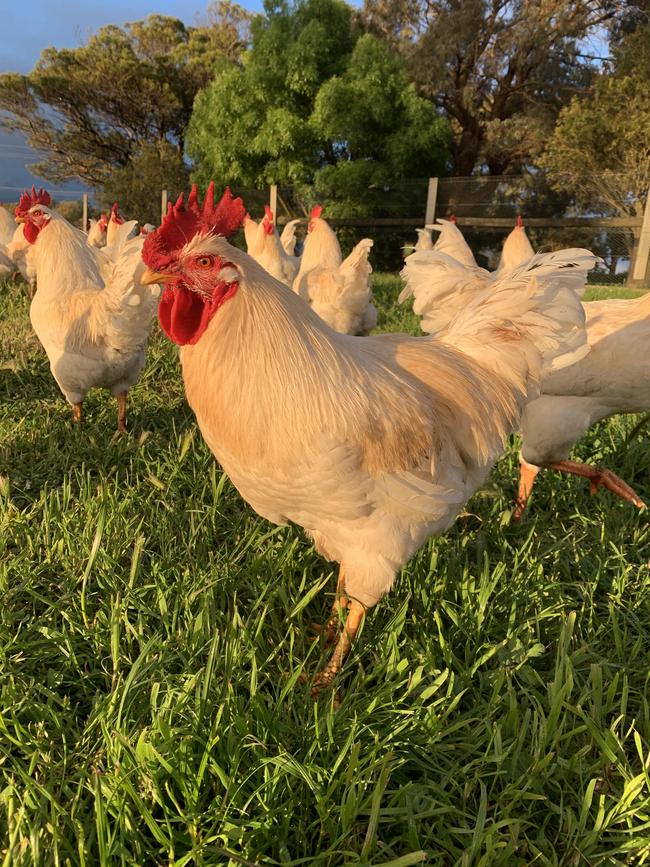
“We were doing a couple hundred meat chickens on the side, as a feasibility study, just to see if we could,” Xavier said, explaining they started buying in male day-old chicks with every batch of females.
“These birds are not dedicated meat breeds.
“The females are genetically bred to not eat much, to be small, to not have much meat on them; and that is what the males are: slow growers and you’ll never change that.”
Over time they learnt the young cockerels needed about 21 weeks to hit a whole-carcass dressed weight of 2.1kg, raised on the same feed as hens.
Their female counterparts start laying (and producing income) at about 20 weeks, with eggs sold by the dozen through retailers in Melbourne and across southwest Victoria.
The young roosters are leaner than a meat breed, and have darker meat that is succulent if cooked slowly – mirroring the way they are raised.
Chooks at the Rooke now processes 600 cockerels a month, supplying whole birds, complete with head, feet and offal, to high-end eateries from the Whitsundays to South Australia’s Barossa Valley.
Birds sell for $18 to $23 a kilogram, averaging about $40 each. Home deliveries are a promising market that Xavier hopes to also crack.
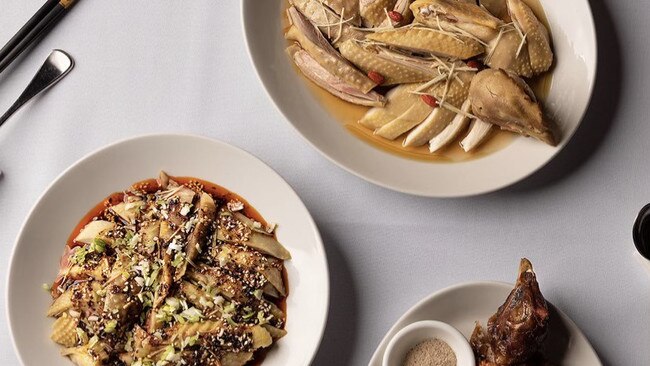
“It has been a long road – six years, on and off chipping away at it,” Xavier said. “It was really about 18 months ago when we won the Harvey Norman Delicious Produce award for Australia’s best produce ‘From the Paddock’; that is when we got on the radar of Australia’s best chefs and restaurants.
“That also gave us the confidence to sit back and go, well … if it is Australia’s best paddock produce, this is viable. We can raise more of these and create more awareness around the egg industry and what we think needs to be improved as far as animal welfare is concerned.”
IN THE PADDOCKS
While roosters spend 150 days on pasture before processing, hens remain on the farm until 18 months of age, at which point they are sold as backyard birds.
All chooks are housed in mobile hen sheds – built by Xavier, who trained as a builder. Each accommodates 1000 birds, with hens and cockerels kept separately. Stocking density is 94 birds a hectare – much less than the free-range industry maximum of 10,000 a hectare.
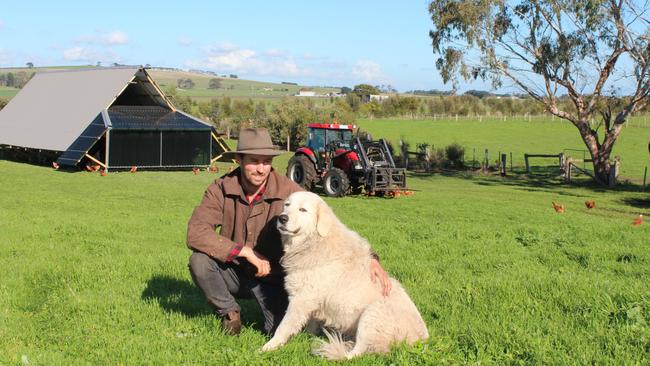
Recently, they expanded Three new flat-packed shelters, manufactured in France, have just been added to the farm and feature automatic temperature control and auger-powered feed systems.
They also run 50 Angus cows and calves, to manage soil and pasture in a way that “mimics nature”.
“If there were no cows here, the grass would all be 2m high,” Xavier said. “The cows keep the grass down to optimum chook height, and the mobile sheds follow the cows around the farm.”
The system meant they didn’t need to apply any synthetic fertilisers or chemicals, Xavier said.
“That is what gives me so much satisfaction,” he added.
“The land is always improving. The fertility is always going up. I can’t see one aspect of what we do that comes at the expense of the animals’ or land’s welfare.”
It is a part of the Chooks at the Rooke story that catches the interest of chefs. But, Xavier said, what tempted chefs to become repeat buyers was the birds’ standout flavour.
PLATE UP
The secret to great taste has been ensuring cockerels have access to green grass, bugs and grubs, and are allowed to mature slowly.
“I feel like I know a good amount about how to raise the birds and what’s involved to get them to 21 weeks,” Xavier said. “But I’m no cook. I’m far from it.
“Those first few years, I had absolutely zero idea what it meant to brine, to sous vide, to poach a chicken.”
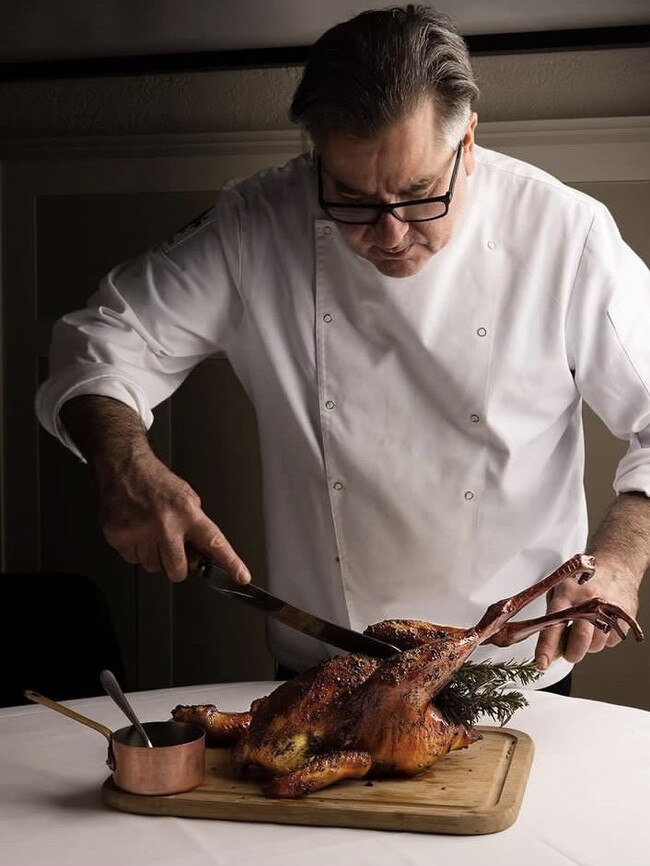
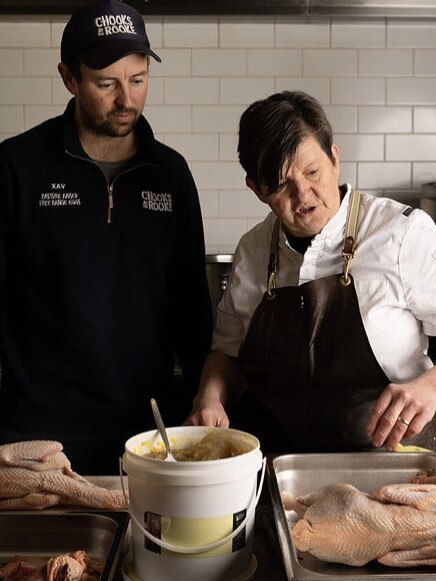
After spending time in chefs’ kitchens, he has grasped how to better market his product to restaurants.
“Now that I understand the methods you have to cook these birds at the optimum, I’m better to go to more chefs and restaurants to explain to them,” he said. “If they ask me how to cook it, I will give them my best suggestions.”
The Delicious Produce award prompted a “spike” in restaurant interest, and to keep momentum going, Xavier took out a loan to invest in marketing. A fresh website overhaul showcases recipes written by three of Australia’s most well-known chefs: Guy Grossi, Annie Smithers and Victor Liong.
“It really helped to open some more doors,” Xavier said.
MORE GOALS
Building the business has been satisfying, but not without challenges.
The biggest, Xavier said, had been trying to educate people about roosters, and securing access to processing.
“It is just a constant battle,” Xavier said, explaining there were few abattoirs in Victoria that provided services to small-scale chicken producers.
He hoped to increase his monthly batches to 1000 birds by the end of this year, with a goal to eventually go weekly.
In the future, he hopes to invest in an on-farm, export-accredited processing plant.
“The ultimate goal is I think we can export them into Singapore and Hong Kong,” he said.
Ultimately, the growth trajectory of Chooks at the Rooke would be determined by which enterprises could pay their own way, Xavier said.
“It needs to be a sustainable business model for there to be longevity in what we do,” he said. “Like anything, you have to crawl before you can walk.
“There is no point going and building a processing plant if you are not going to sell enough to pay for it. That is our next major hurdle.”




